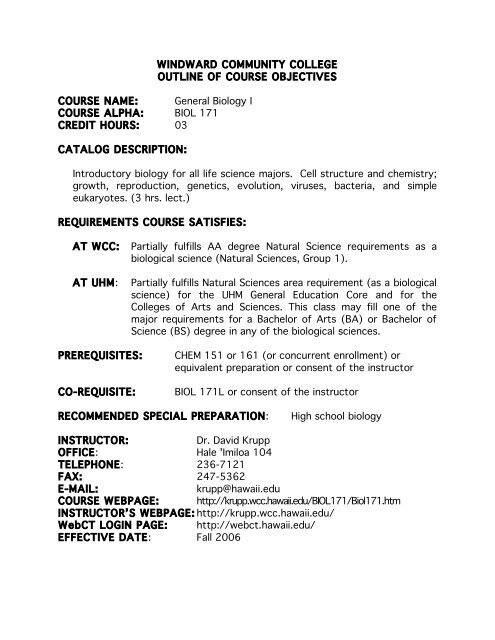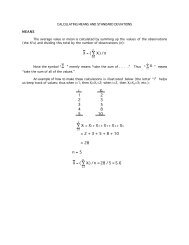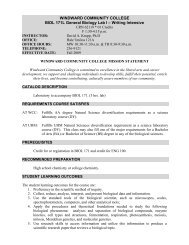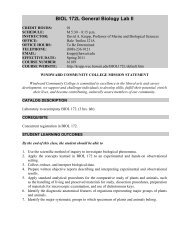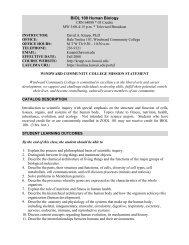You also want an ePaper? Increase the reach of your titles
YUMPU automatically turns print PDFs into web optimized ePapers that Google loves.
WINDWARD COMMUNITY COLLEGEOUTLINE OF <strong>COURSE</strong> OBJECTIVES<strong>COURSE</strong> NAME: <strong>General</strong> <strong>Biology</strong> I<strong>COURSE</strong> <strong>ALPHA</strong>: BIOL 171CREDIT HOURS: 03CATALOG DESCRIPTION:Introductory biology for all life science majors. Cell structure and chemistry;growth, reproduction, genetics, evolution, viruses, bacteria, and simpleeukaryotes. (3 hrs. lect.)REQUIREMENTS <strong>COURSE</strong> SATISFIES:AT WCC:AT UHM:Partially fulfills AA degree Natural Science requirements as abiological science (Natural Sciences, Group 1).Partially fulfills Natural Sciences area requirement (as a biologicalscience) for the UHM <strong>General</strong> Education Core and for theColleges of Arts and Sciences. This class may fill one of themajor requirements for a Bachelor of Arts (BA) or Bachelor ofScience (BS) degree in any of the biological sciences.PREREQUISITES:CO-REQUISITE:CHEM 151 or 161 (or concurrent enrollment) orequivalent preparation or consent of the instructorBIOL 171L or consent of the instructorRECOMMENDED SPECIAL PREPARATION:High school biologyINSTRUCTOR:Dr. David KruppOFFICE: Hale 'Imiloa 104TELEPHONE: 236-7121FAX: 247-5362E-MAIL:krupp@hawaii.edu<strong>COURSE</strong> WEBPAGE: http://krupp.wcc.hawaii.edu/BIOL171/Biol171.htmINSTRUCTOR’S WEBPAGE: http://krupp.wcc.hawaii.edu/WebCT LOGIN PAGE: http://webct.hawaii.edu/EFFECTIVE DATE: Fall 2006
Windward Community College BIOLOGY 171 2<strong>COURSE</strong> GOALSUpon completion of this course, you should:‣ have an appreciation from how science attempts to understand the universe;‣ understand the chemical basis for life and the characteristics that distinguish livingthings from inanimate matter;‣ be introduced to and become familiar with the basic integrating principles of biology,including cell structure and chemistry, higher systematics, reproduction, genetics andevolution of living things.<strong>COURSE</strong> OBJECTIVESThe student will describe and integrate basic biological principles and define basic biologicalterms presented in lecture and required texts, citing specific examples when asked for. Theseprinciples includes the following areas:‣ the philosophy and characteristics of science and the scientific method;‣ the difference between hypotheses, theories and laws in science;‣ the definition of life and how living things differ from inanimate objects;‣ how living things are classified and named; the characteristics used to classify livingthings;‣ the chemical architecture of living things and the functions of the major groups ofbiological molecules;‣ the parts, their structures and functions, of cells and how prokaryotic cells differ fromeukaryotic cells;‣ cell metabolism including specific anabolic and catabolic processes;‣ cell growth and division processes, mitosis and meiosis;‣ how genetic information is passed from parents to offspring and how this geneticinformation is expressed by cells;‣ evolution as the unifying principle of biological science; and the evidence supportingevolution and natural selection.‣ the characteristics and biology of viruses, prokaryotes, protists, and fungi.‣ current hypotheses/theories regarding the origin of life, eukaryotic cells, sexuality, andmulticellularity.To help you achieve the course objectives, you may be provided with lecture outlines hatinclude vocabulary terms and study questions. You should use these materials as guides to helpyou focus on what materials to study.MODE OF INSTRUCTIONThe previously described objectives will be achieved through the aid of the following learningactivities:‣ Assigned readings;‣ Televised lecture and demonstrations;‣ Computer-assisted and Internet-assisted activities;‣ WebCT-administered course information (e.g. Bulletin Board);‣ WebCT-administered quizzes examinationsThe material presented in all modes of instruction will be of an introductory nature but sufficientin content to allow continuation in higher level biological science courses required for biological
Windward Community College BIOLOGY 171 3science majors. Assigned readings will serve to provide background and supplementalinformation to provide a broad base for a basic study of biology. Class lectures will build uponthis base, helping to focus the student on some of the more important details. Lecture studyguides may be provided to help students focus upon the more significant details from thelecture and text. Multimedia presentations will graphically illustrate course content. Studentsmay also be given the opportunity to access learning tools available through CD-ROM andInternet technologies. Internet resources will provide additional study aids such as sampleexamination questions and links to useful biology websites (the student may also communicatewith the instructor through e-mail correspondence). Quizzes (taken through the Internet) andexaminations (taken through the Internet at specific learning resource centers) will reinforcestudent understanding of the topics covered by testing the student’s knowledge of specificcontent.EVALUATION OF OBJECTIVE ACHIEVEMENTEXAMINATIONS. The student will take two non-cumulative midterm examinations (100 pointseach) and a cumulative final examination (150 points) to demonstrate understanding ofinformation presented primarily during lectures. The first midterm examination will coverinformation presented during the first third of the course. The second midterm examination willcover information presented during the second third of the course. Two thirds of the finalexamination will emphasize the final third of the course, while one third of the final will draw oninformation covered during the first and second thirds of the course. The closed-book,proctored examinations will be administered through the Internet using WebCT at your campus’Learning Center. NO RETESTS will be given. A student missing an exam because of adocumented illness or emergency may be allowed to take a make-up exam. In such acircumstance, the student should make every reasonable attempt to contact the instructorbefore the exam is administered to the class (or as soon as possible). While make-up exams willcover the same content area as a missed exam, the exam format and specific questions may bedifferent.QUIZZES. The student will take a minimum of ten quizzes (15 points each; 150 points total)administered through the Internet (WebCT) during specified time periods (but not during classsessions). These quizzes will address the detailed content and major concepts presented in thelectures, lecture outlines, text readings, and study guide activities. If the student takes morethan ten quizzes, only the best ten quiz scores will be used in calculating the student's totalpoints. Since these quizzes may be taken using home computers connected to the Internet,students may refer to instructional resources (text, study guide, lecture notes, etc.) whiletaking the quizzes. However, the quizzes will be timed, the student having only 20 minutes tocomplete each quiz.METHOD OF GRADINGThe assignment of points will be according to the following protocol:Midterm Examinations (100 points each)Final ExaminationQuizzes (10 @ 15 points each)TOTAL200 points150 points150 points500 pointsNO EXTRA CREDIT opportunities will be provided. The student should focus his/her attentionon the information required for quizzes, and examinations.
Windward Community College BIOLOGY 171 4Letter grades will be assigned as follows:A------- 90% or above in total points.B ------- 80-89.9% of total points.C ------- 65-79.9% of total points.D------- 55-64.9% of total points.F ------- Below 55% of total points or informal or incomplete official withdrawal from course.I -------- Incomplete; given at the INSTRUCTOR'S OPTION when student is unable to completea small part of the course because of circumstances beyond his or her control. It is theSTUDENT'S responsibility to make up incomplete work. Failure to satisfactorily makeup incomplete work within the appropriate time period will result in a grade change for"I" to the contingency grade identified by the instructor (see catalog).CR ----- 65% or above in total points; the student must indicate the intent to take the course asCR/NC in writing by the end of the 10th week of classes (see catalog).NC ----- Below 65% of total points; this grade only available under the CR/NC option (see aboveand see catalog).N------- NOT GIVEN BY THIS INSTRUCTOR EXCEPT UNDER EXTREMELY RARECIRCUMSTANCES (e.g., documented serious illness or emergency that prevents thestudent from officially withdrawing from the course); never used as an alternative for an"F" grade.W ------ Official withdrawal from the course after the third week and prior to the end of the 10thweek of classes (see catalog).Waiver of minimum requirements for specific grades will be given only in unique situations at theinstructor's discretion.Students are expected to access the BIOL 171 WebCT site on a regular basis (i.e., at least twiceper week). Students failing to access the BIOL 171 WebCT site for a period of greater than twoweeks will be prevented from any future access to this site and the student will received an “F”for the course.Students involved in academic dishonesty will receive an "F" grade for the course. Academicdishonesty is defined in WCC's college catalog.STUDENT RESPONSIBILITIESStudents are expected to participate in all lecture activities and complete all course activities ontime.Students are expected to be prepared in advance before each televised session. Being preparedincludes the following: having already read text materials (e.g., textbook readings, study guidesand handouts) assigned for that day's activities and bringing required work materials (e.g.,textbook, handouts, writing supplies, etc.).Any changes in the course schedule, such as examination dates, deadlines, etc., will beannounced ahead of time in class or on the BIOL 171 WebCT Bulletin Board. It is the student'sresponsibility to be informed of these changes.It is the student's responsibility to be informed about deadlines critical to making registrationchanges (e.g., last day of erase period and last day for making an official withdrawal.
Windward Community College BIOLOGY 171 5The student should understand that "INTRODUCTORY" DOES NOT MEAN "EASY".Students should expect a level of difficulty comparable to other 100-level science classesintended for majors in the discipline. When difficult concepts and detailed information arepresented, it is the student's responsibility to take the appropriate steps to learn andunderstand these concepts and information.Science courses at W.C.C. generally require two to three hours of independent private studytime for each hour in class. However, because of the nature of the material presented in BIOL171, more study time may be required (depends upon the student's science/biologybackground). It is the student's responsibility to allocate the appropriate time needed for studyin an environment conducive to quality study. The student must budget time efficiently and berealistic about all personal and professional commitments that consume time.HOW TO SUCCEED IN THIS CLASSUnderstanding biological science involves understanding many difficult concepts and vocabulary,not just knowing facts. You should know that the details to these concepts are important. Inaddition, you will be introduced to hundreds of new words. In some cases, words that arefamiliar to you in a context other than biology will be introduced to you in the context ofbiology. You will need to understand and use these terms in a biological science context.While you may refer to lecture outlines that include study guides, you will not succeed in thisclass unless you take your own careful lecture notes and read the corresponding material in thetextbook. The lecture outlines are not to be used in place of your own note taking. As soon aspossible (best if you do it the same day), copy over your lecture notes filling in gaps andmissing information by referring to the lecture outlines and textbook. You should carefullyreview these rewritten lecture notes as often as possible. In addition to reviewing these notesbefore an exam, it would be useful to try to rewrite these notes from memory.In addition to copying over your lecture notes, your study activities should include drawing yourown labeled diagrams or graphs that illustrate important biological phenomena (e.g., the internalstructure of the cell, the stages of cell division, or the population growth curve). Thesediagrams need not be works of art, but should clearly illustrate significant information. Beforean exam, it would be useful to redraw these labeled diagrams and graphs from memory.Make flashcards for each new vocabulary word you learn (refer to study guides provided for alist of terms). On one side write the word. On the other side write the appropriate biologicalscience definition for the word. Test your ability to provide the right definition as often aspossible. Practice using the word to explain biological concepts.Write out answers to all of the study guide questions as though you were required to turn themin. Allow someone else to read your answers and give you feedback. Read someone else'sanswers and provide constructive feedback.Read the textbook materials corresponding to a particular lecture before and after that lecture.Review this material before exams.
Windward Community College BIOLOGY 171 6TEXTBOOK AND OTHER ASSIGNED INSTRUCTIONAL MATERIALSCampbell, N.A., and J.B. Reece. 2005. <strong>Biology</strong>, Seventh Edition. Benjamin/Cummings, SanFrancisco, CATaylor, M.R., 2005. Student Study Guide for <strong>Biology</strong>, Seventh Edition. Benjamin/Cummings, SanFrancisco, CAKrupp, D.A., 2005. <strong>Biology</strong> 171 <strong>General</strong> <strong>Biology</strong> I Lecture Outlines and Study Guides (availableonly as individual Internet-downloadable pdf files from the course WebCT site)Other reading assignments may be found on reserve in the library, provided in class, or accessedthrough the Internet.OTHER INFORMATIONImportant Dates:First day of instruction ............................. 21 AugustLast day to add a class ............................. 25 AugustLast day of erase period ........................... 10 SeptemberLast day for official withdrawal ................ 30 OctoberLast day of instruction.............................. 07 DecemberExam period ............................................... 11-14 DecemberInstructor’s Office Hours (or by appointment):MWF 9:00 a.m. – 10:00 a.m.Th 6:15 - 7:15 p.m.


